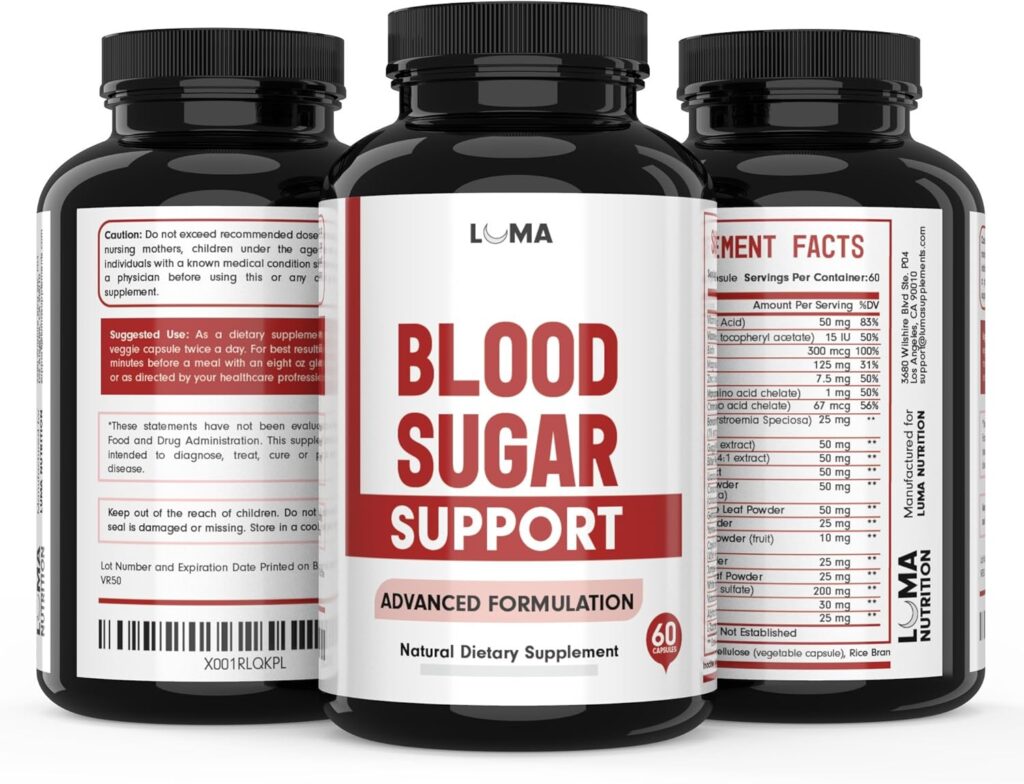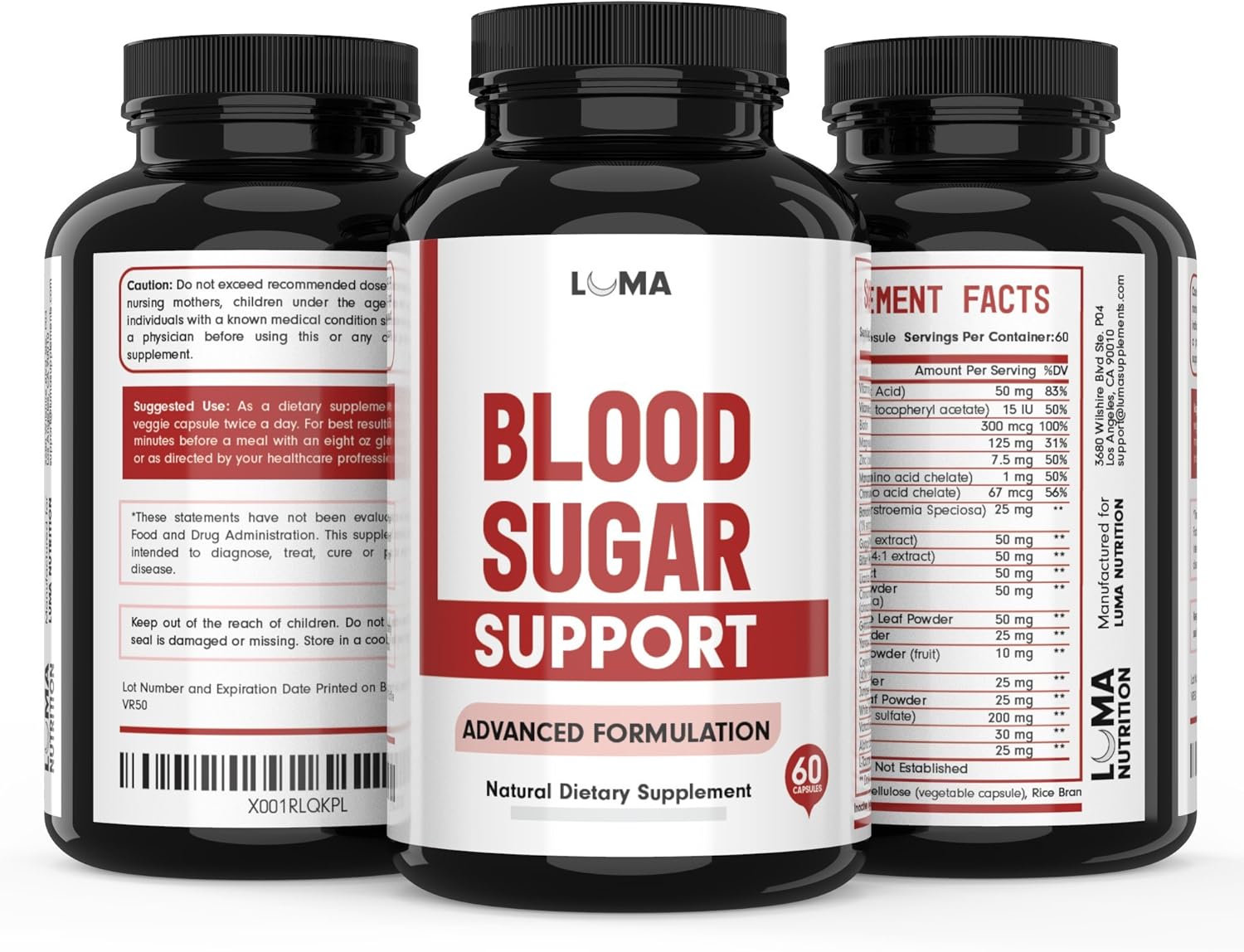
Supplements to Control Blood Sugar: A Comprehensive Guide
Maintaining healthy blood sugar levels is crucial for overall well-being. For individuals struggling with blood sugar management, lifestyle modifications such as diet and exercise are often the first line of defense. However, certain supplements to control blood sugar may offer additional support. This guide explores various supplements, their potential benefits, and important considerations before incorporating them into your regimen.
Understanding Blood Sugar and Its Importance
Blood sugar, or glucose, is the primary source of energy for the body’s cells. It comes from the food we eat. When blood sugar levels are consistently high (hyperglycemia) or low (hypoglycemia), it can lead to various health complications. Conditions like type 2 diabetes, insulin resistance, and metabolic syndrome are directly linked to impaired blood sugar control. Therefore, effectively managing blood sugar is paramount for preventing and mitigating these risks.
Key Supplements for Blood Sugar Management
Chromium
Chromium is a trace mineral that plays a role in insulin sensitivity. Insulin is a hormone that helps glucose enter cells for energy. Studies suggest that chromium supplementation may improve insulin sensitivity, thereby aiding in blood sugar control. Chromium picolinate is a commonly used and well-absorbed form of chromium. However, more research is needed to determine the optimal dosage and long-term effects.
Cinnamon
Cinnamon, a popular spice, has demonstrated potential benefits for blood sugar control in some studies. It may help improve insulin sensitivity and reduce post-meal blood sugar spikes. Cinnamon contains compounds that mimic the effects of insulin, potentially enhancing glucose uptake by cells. It’s important to note that cassia cinnamon, the most common type found in grocery stores, contains higher levels of coumarin, which can be harmful in large doses. Ceylon cinnamon (‘true’ cinnamon) contains lower levels of coumarin and may be a safer alternative for regular consumption.
Berberine
Berberine is a compound found in several plants, including goldenseal, barberry, and Oregon grape. It has been shown to have significant effects on blood sugar control, often compared to those of some pharmaceutical medications. Berberine may improve insulin sensitivity, decrease glucose production in the liver, and slow down the breakdown of carbohydrates in the gut. While berberine is generally considered safe, it can interact with certain medications and may cause digestive side effects in some individuals. [See also: Berberine Benefits and Side Effects].
Magnesium
Magnesium is an essential mineral involved in numerous bodily functions, including insulin signaling. Research indicates that magnesium deficiency is associated with insulin resistance and an increased risk of type 2 diabetes. Supplementing with magnesium may improve insulin sensitivity and help regulate blood sugar levels. Magnesium citrate, magnesium oxide, and magnesium glycinate are common forms of magnesium supplements, each with varying levels of bioavailability. Magnesium glycinate is often preferred due to its better absorption and gentler effect on the digestive system.
Alpha-Lipoic Acid (ALA)
Alpha-lipoic acid (ALA) is a naturally occurring antioxidant that may improve insulin sensitivity and reduce nerve damage associated with diabetes (diabetic neuropathy). ALA helps convert glucose into energy and may also protect against oxidative stress, a contributing factor to insulin resistance. ALA supplements are available in various forms, including R-ALA, which is considered to be the more biologically active form. It’s important to consult with a healthcare professional before taking ALA, especially if you have diabetes or are taking other medications that affect blood sugar control.
Fenugreek
Fenugreek is an herb traditionally used in Indian cuisine and medicine. Studies suggest that fenugreek seeds may help lower blood sugar levels by slowing down carbohydrate absorption in the gut and improving insulin function. Fenugreek contains soluble fiber, which can help regulate blood sugar spikes after meals. It can be consumed as a spice, in capsule form, or as a tea. Some individuals may experience digestive side effects such as gas or bloating when taking fenugreek supplements.
Gymnema Sylvestre
Gymnema Sylvestre is an herb native to India and Africa that has been used for centuries in traditional medicine to treat diabetes. It may help lower blood sugar levels by reducing sugar absorption in the intestines and promoting insulin secretion. Gymnema Sylvestre also has the interesting property of suppressing the taste of sugar, which may help reduce sugar cravings. It’s important to note that Gymnema Sylvestre can interact with diabetes medications, so it’s crucial to consult with a healthcare professional before using it.
Probiotics
Emerging research suggests that the gut microbiome plays a significant role in blood sugar control. Probiotics, which are beneficial bacteria, may help improve insulin sensitivity and reduce inflammation, both of which can contribute to better blood sugar management. Different strains of probiotics may have different effects, so it’s important to choose a probiotic supplement that contains strains that have been shown to be beneficial for blood sugar control, such as Lactobacillus and Bifidobacterium species. [See also: Gut Health and Diabetes].
Important Considerations Before Taking Supplements
- Consult with a Healthcare Professional: Before starting any new supplement regimen, it’s crucial to consult with a doctor, registered dietitian, or other qualified healthcare professional. They can assess your individual needs, evaluate potential risks and interactions with medications, and provide personalized recommendations.
- Understand Potential Interactions: Supplements can interact with medications, including diabetes medications. It’s essential to inform your healthcare provider about all supplements you are taking to avoid potentially dangerous interactions.
- Choose High-Quality Supplements: Look for supplements that have been tested by a third-party organization, such as USP, NSF International, or ConsumerLab.com, to ensure quality and purity.
- Monitor Blood Sugar Levels: If you have diabetes or are at risk for diabetes, regularly monitor your blood sugar levels to assess the effectiveness of the supplements and make adjustments as needed.
- Lifestyle Modifications are Key: Supplements should be used as an adjunct to a healthy lifestyle, not as a replacement for it. A balanced diet, regular exercise, and stress management are essential for optimal blood sugar control.
The Role of Diet and Exercise
While supplements to control blood sugar can be helpful, they are most effective when combined with a healthy diet and regular exercise. A diet rich in fiber, whole grains, lean protein, and healthy fats can help regulate blood sugar levels. Regular physical activity improves insulin sensitivity and helps the body use glucose more efficiently. Aim for at least 150 minutes of moderate-intensity aerobic exercise or 75 minutes of vigorous-intensity aerobic exercise per week, along with strength training exercises at least two days per week.
Future Research Directions
The field of supplements to control blood sugar is constantly evolving, with new research emerging regularly. Future studies should focus on:
- Identifying the optimal dosages and formulations of different supplements for blood sugar control.
- Investigating the long-term effects of supplement use on blood sugar management and overall health.
- Exploring the potential of personalized supplement regimens based on individual genetic and metabolic profiles.
- Conducting larger, well-designed clinical trials to confirm the efficacy of various supplements for blood sugar control.
Conclusion
Supplements to control blood sugar may offer valuable support for individuals seeking to manage their blood sugar levels. However, it’s crucial to approach supplement use with caution and under the guidance of a healthcare professional. By combining supplements with a healthy diet, regular exercise, and other lifestyle modifications, individuals can take proactive steps to improve their blood sugar control and overall well-being. Remember, managing blood sugar effectively is a long-term commitment that requires a holistic approach.

